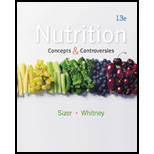
Nutrition: Concepts and Controversies
13th Edition
ISBN: 9781133603184
Author: Frances Sizer, Ellie Whitney
Publisher: Cengage Learning
expand_more
expand_more
format_list_bulleted
Question
Chapter 3, Problem 9SC
Summary Introduction
Introduction:
Digestion is the process by which the food we eat is converted into the absorbable form in the body in order to meet the energy requirements of the body. The two types of digestion that take place in the body: mechanical and chemical digestion respectively.
Expert Solution & Answer
Trending nowThis is a popular solution!

Chapter 3 Solutions
Nutrition: Concepts and Controversies
Knowledge Booster
Similar questions
- Bile has a role in _________ digestion and absorption. a. carbohydrate c. protein b. fat d. amino acidarrow_forwardThe bile from the liver is delivered to the _______. a. stomach b. liver c. small intestine d. colonarrow_forwardFigure 16.7 Which of the following statements about the digestive system is false? a. Chyme is a mixture of food and digestive juices that is produced in the stomach. b. Food enters the large intestine before the small intestine. c. In the small intestine, chyme mixes with bile, which emulsifies fats. d. The stomach is separated from the small intestine by the pyloric sphincter.arrow_forward
- Where does the majority of fat digestion take place? a. mouth b. stomach c. small intestine d. large intestinearrow_forwardExplain the differences between the digestion roles of the small and large intestines. Does the appendix also have a digestive function?arrow_forwardDigestion is completed and products are absorbed in the _________. a. mouth b. stomach c. small intestine d. large intestinearrow_forward
- Figure 34.19 Which of the following statements about digestive processes is true? Amylase, maltaseT and lactase in the mouth digest carbohydrates. Trypsin and lipase in the stomach digest protein. Bile emulsifies lipids in the small intestine. No food is absorbed until the small intestine.arrow_forwardList the organs and accessory organs of the digestive system. On a separate piece of paper, list the main functions of each organ.arrow_forwardAs a person ages, the number of body cells steadily decreases and energy needs decline. If you were planning an older persons diet, what kind(s) of nutrients would you emphasize, and why? Which ones would you recommend an aging person eat less of?arrow_forward
arrow_back_ios
arrow_forward_ios
Recommended textbooks for you
 Medical Terminology for Health Professions, Spira...Health & NutritionISBN:9781305634350Author:Ann Ehrlich, Carol L. Schroeder, Laura Ehrlich, Katrina A. SchroederPublisher:Cengage Learning
Medical Terminology for Health Professions, Spira...Health & NutritionISBN:9781305634350Author:Ann Ehrlich, Carol L. Schroeder, Laura Ehrlich, Katrina A. SchroederPublisher:Cengage Learning
 Concepts of BiologyBiologyISBN:9781938168116Author:Samantha Fowler, Rebecca Roush, James WisePublisher:OpenStax College
Concepts of BiologyBiologyISBN:9781938168116Author:Samantha Fowler, Rebecca Roush, James WisePublisher:OpenStax College Comprehensive Medical Assisting: Administrative a...NursingISBN:9781305964792Author:Wilburta Q. Lindh, Carol D. Tamparo, Barbara M. Dahl, Julie Morris, Cindy CorreaPublisher:Cengage Learning
Comprehensive Medical Assisting: Administrative a...NursingISBN:9781305964792Author:Wilburta Q. Lindh, Carol D. Tamparo, Barbara M. Dahl, Julie Morris, Cindy CorreaPublisher:Cengage Learning

Medical Terminology for Health Professions, Spira...
Health & Nutrition
ISBN:9781305634350
Author:Ann Ehrlich, Carol L. Schroeder, Laura Ehrlich, Katrina A. Schroeder
Publisher:Cengage Learning



Concepts of Biology
Biology
ISBN:9781938168116
Author:Samantha Fowler, Rebecca Roush, James Wise
Publisher:OpenStax College


Comprehensive Medical Assisting: Administrative a...
Nursing
ISBN:9781305964792
Author:Wilburta Q. Lindh, Carol D. Tamparo, Barbara M. Dahl, Julie Morris, Cindy Correa
Publisher:Cengage Learning